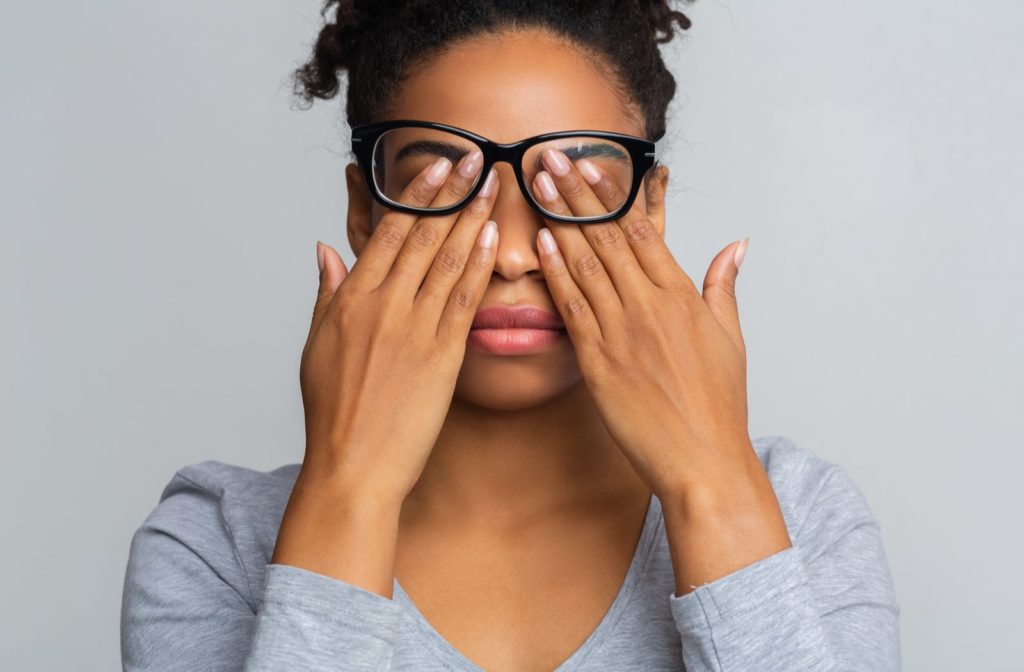You may have noticed that your eyes feel dry, itchy, or even watery in some cases. These symptoms can be a sign of dry eye disease and should not be ignored. Keeping up with your eye exams can help you detect and treat dry eyes to prevent further discomfort.
Let’s look at what dry eye disease is, some symptoms you’ll notice, treatment options, and what happens if you don’t treat dry eyes.
What Is Dry Eye Disease?
Dry eye disease is a common condition that occurs when your eyes don’t produce enough tears or those tears evaporate too quickly. Dry eyes can be very uncomfortable and leave you scratching and tending to your eyes multiple times throughout the day.
Your tear film consists of 3 layers: fatty oils, aqueous fluid, and mucus. This combination keeps your eyes lubricated, and any interruption to these layers can lead to dry eyes. Even overnight, while sleeping, this disruption can occur.
Some common causes of dry eye include:
- Overexposure to digital screens
- Contact lenses
- Blepharitis
- Allergies
- Exposure to smoke or wind
- Menopause
These symptoms are apparent with dry eye disease, and diagnosis comes down to looking out for the symptoms.
Symptoms of dry eye disease include:
- Blurred vision
- Burning or itchy eyes
- Eye fatigue
- Watery or teary eyes
- Eye and eyelid redness
- Eye pain
If you come across these symptoms, you may be suffering from dry eye. While it’s possible that these symptoms may fade away and correct themselves on their own but if prolonged signs of these symptoms persist, contacting your optometrist is advisable.
Ignoring Dry Eye Treatment
Several signs of severe eye discomfort can recognize dry eye disease. When left untreated—these signs can become chronic symptoms and be even more dangerous to your vision.
The most important thing to keep in mind with dry eyes is that you don’t have to suffer and deal with it without treatment. Ignoring treatment will only prolong your discomfort and can be damaging to your vision.
Maintaining a consistent schedule with comprehensive eye exams with your optometrist is the best way to monitor your symptoms and get treatment. From those eye exams, you can better understand your treatment options.
Medicated Eye Drops
Your eyes need hydration and healthy, plentiful tears to function properly, and dry eye disease can affect that lubrication. Your optometrist may recommend special medicated prescription eye drops such as Restasis and Xiidra.
Punctal Plugs
Excessive tear drainage can contribute to dry eye disease. The ongoing dryness causes you to produce more tears, but these tears are mostly water and don’t provide the necessary moisture for your eyes.
Punctal plugs can be inserted into your tear ducts to preserve natural tears. This procedure is generally painless and reversible and designed to help retain moisture in your eyes.
Serum Tears
Serum tears are a progressive method for the management of severe dry eye. Clear blood substances removed of proteins can be added to artificial tears—they involve using ingredients of your own blood to treat dry eye disease.
This treatment method has helped some patients gain relief from severe dry eye symptoms.
Heat Masks
Heat masks are a great option to relieve dry eye symptoms by gently applying regulated heat to the outside of the eyes and eyelids. This treatment is best utilized as a complementary practice with other treatments and can provide relief.
Scleral Contact Lenses
Scleral contacts are large-diameter gas-permeable contact lenses designed to cover the entire corneal surface and rest of the sclera. Scleral contacts provide a pristine reservoir of tears that can morph an irregular cornea into a smooth optical surface.
Scleral contacts are gas-permeable, allowing oxygen to reach the eye’s surface, resulting in more breathability for your eye.
If you love wearing your contact lenses and are dealing with dry eye disease, scleral contacts are a great option to keep your ideal look.
Your eye doctor can provide these various treatments for you and work with you to prevent your dry eye symptoms from running wild.
The Importance of Consistency
Ignoring treatment for your dry eyes can cause prolonged discomfort. Seeking out treatment as soon as possible is your best option to achieve the level of comfort you’re used to.
Book an appointment with your optometrist today to learn more about the importance of treating dry eye disease.



